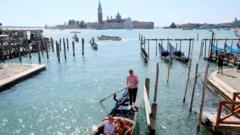In recent days, the health of Pope Francis has become a focal point of baseless speculation and conspiracy theories as he receives treatment for a complex lung infection in a Rome hospital. Unfounded claims proliferate, suggesting that the pontiff is deceased and that secrets are being concealed by an alleged "papal deep state."
Pope Francis's Health Sparks Wild Conspiracy Theories Amid Hospitalization

Pope Francis's Health Sparks Wild Conspiracy Theories Amid Hospitalization
As rumors about the Pope's condition swirl, misinformation intensifies in the digital age, challenging the Vatican's communications.
The 8th King of Rome, a self-styled "trash influencer," slipped into the hospital disguised to assert that the Pope was not present. His theatrics reflect a broader trend, as social media platforms, Telegram channels, and WhatsApp groups buzz with unverified assertions about the Pope's fate. In response, cardinals from the Roman Catholic Church have urged the public to "free ourselves from much fake news" regarding Francis’s health.
Despite the Vatican's efforts to combat misinformation by offering frequent and detailed updates about the Pope’s condition, skepticism continues to thrive. In a bid for transparency, the church has broken its traditional silence, even publishing candid details about the Pope’s health, including alarming circumstances surrounding his treatment. Yet, the resolve of online doubters remains unshaken, as the Vatican's historical reputation for secrecy fuels ongoing conspiracies.
Cardinal Gianfranco Ravasi voiced frustration over the situation, stating, “They say we, the Roman Curia, keep Francis frozen so that we can do our scheming.” Although the Vatican reported improvements in the Pope's health and shared audio and visual content of his recovery, the persistence of rumors underscores the influence of social media and the evolving landscape of public discourse surrounding health crises in religious leadership.
Despite the Vatican's efforts to combat misinformation by offering frequent and detailed updates about the Pope’s condition, skepticism continues to thrive. In a bid for transparency, the church has broken its traditional silence, even publishing candid details about the Pope’s health, including alarming circumstances surrounding his treatment. Yet, the resolve of online doubters remains unshaken, as the Vatican's historical reputation for secrecy fuels ongoing conspiracies.
Cardinal Gianfranco Ravasi voiced frustration over the situation, stating, “They say we, the Roman Curia, keep Francis frozen so that we can do our scheming.” Although the Vatican reported improvements in the Pope's health and shared audio and visual content of his recovery, the persistence of rumors underscores the influence of social media and the evolving landscape of public discourse surrounding health crises in religious leadership.




















